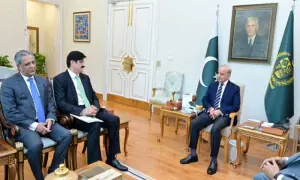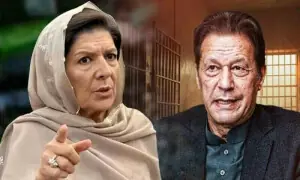Military courts: Understanding army act solves half the issue, says Justice Mandokhail
5 min readA seven-member constitutional bench of the Supreme Court, headed by Justice Aminuddin Khan, continued hearing intra-court appeals against the trial of civilians in military courts.
During the proceedings, Justice Jamal Mandokhail remarked that if the purpose behind the formation of the Army Act was understood, half of the problem would be resolved.
PTI founder Imran Khan’s lawyer, Uzair Bhandari, resumed his arguments, stating that even if the Army Act is nullified, the Anti-Terrorism Act remains in place.
He emphasised that when multiple legal forums exist, the court must determine where fundamental rights are best protected. He further argued that Article 245 of the Constitution does not grant judicial powers to the military.
Also, read this
Chief justice meets SCBA delegation, discusses judicial reforms
SC asks govt for clarity on process of military trials
Military courts case: SC questions how executive can behave as judge
Justice Mandokhail inquired whether a court-martial is considered a judicial proceeding.
Bhandari responded that while court-martial is a judicial power, it applies only to military personnel, not civilians.
Justice Amin pointed out that some civilians also fall under the Army Act’s jurisdiction and questioned how this distinction would be made.
He added that referencing Article 245 in this case was irrelevant.
Justice Mandokhail observed that the Constitution grants the military two types of authority: national defence and assisting the civilian government.
Justice Amin questioned how the military would defend its own institutions if Article 245 was strictly applied.
“If GHQ is attacked, should the military wait for an Article 245 notification?” he asked.
Bhandari responded that in an active attack, no permission is required for defence, and security agencies, including the police and the military, to take immediate action.
He referenced a past Supreme Court ruling in the Liaquat Hussain case, which stated that if the army arrests an attacker, the detainee must be handed over to civilian authorities.
Justice Naeem Afghan raised the question of where the trial would be conducted if military and civilian individuals collectively violated the Official Secrets Act.
Bhandari asserted that such cases should be tried in anti-terrorism courts.
Justice Mandokhail reiterated that understanding the purpose behind the Army Act would resolve much of the confusion, noting that the Constitution specifies the scope of laws concerning the armed forces.
Justice Hassan Azhar Rizvi commented on past events, recalling that during curfews in Karachi, people used to welcome the army with flowers.
He then asked Bhandari, as the counsel for the former prime minister, whether Imran Khan had condemned the events of May 9.
“Has he explicitly condemned these incidents in a written submission to the court?”
Bhandari responded that Imran Khan’s supplementary petition, which is part of the court record, includes a condemnation of the May 9 incidents.
He added that Khan had stated that those responsible should be punished, but emphasised that condemning the events does not mean accepting the government’s narrative.
Justice Rizvi remarked that condemning such actions is a positive step.
Justice Mandokhail questioned whether a prime minister could stay in office beyond their constitutional tenure.
Bhandari responded that a prime minister elected for five years cannot extend their term to six years. Justice Muhammad Ali Mazhar stated that if court-martial is accepted as legitimate for military personnel, then the argument moves beyond Article 175.
He agreed with Justice Munib Akhtar’s ruling on the matter.
Justice Aminuddin Khan noted that he had been warning from the outset that the burden of this case would ultimately fall on the judiciary.
Justice Mandokhail observed that the bench seemed to be mixing the arguments presented by different lawyers.
He referenced Salman Akram Raja’s remarks about a separate forum for court-martial in India, while Justice Mazhar clarified that Raja’s stance differed from others.
Justice Mandokhail asserted that the court is not bound by arguments alone and can rule independently based on the Constitution.
Bhandari argued that the military cannot take action against civilians outside the scope of Article 245.
“If there is any secret authority allowing this, show it to us, and we will accept it,” he challenged.
He further stated that civilian authorities always have supremacy over the military and that allowing commanding officers to take custody of civilian suspects would undermine this principle.
After a brief recess, the hearing resumed, with Bhandari insisting that his legal position should be fully heard and uninterrupted.
“Let my train of arguments run; the bench asks many questions,” he remarked. Justice Aminuddin Khan responded that their questions were merely to seek clarity.
During the session, Bhandari referenced a 1958 ruling by Justice Munir to define judicial power.
Justice Mandokhail then asked whether the court could nullify an order issued by the prime minister, to which Bhandari replied that the judiciary indeed has the authority to do so.
Justice Aminuddin Khan noted that no prime minister in Pakistan’s history had completed a full five-year term.
Justice Musarrat Hilali added that the country had never seen a prime minister bold enough to serve a complete term.
Bhandari countered that, while no prime minister had lasted five years, presidents had remained in office for longer periods. Justice Mandokhail remarked that the judiciary had also validated military dictatorships in the past.
Bhandari further argued that if the Army Act allows military trials for civilians, it could eventually expand to cover additional crimes as well. Justice Amin noted that while Bhandari was referencing Article 245, the issue at hand was different.
Justice Muhammad Ali Mazhar clarified that invoking Article 245 to deploy the military does not mean granting it judicial authority.
Bhandari maintained that the armed forces cannot replace the judiciary, adding that no constitutional framework allows for military-led court-martials of civilians.
He elaborated that Article 245 defines the armed forces’ jurisdiction and mandates them to act under federal government directives.
He also pointed out that under Article 244, all military personnel must take an oath of allegiance.
For the latest news, follow us on Twitter @Aaj_Urdu. We are also on Facebook, Instagram and YouTube.
























Comments are closed on this story.